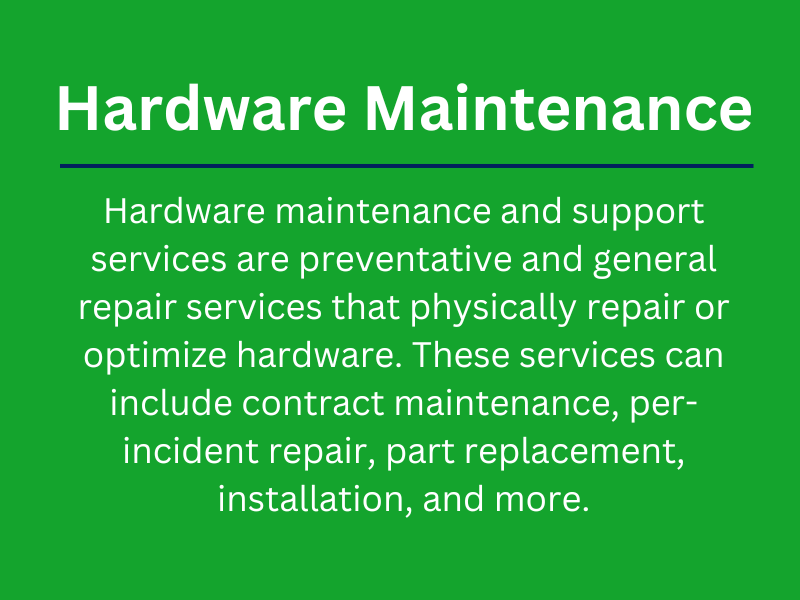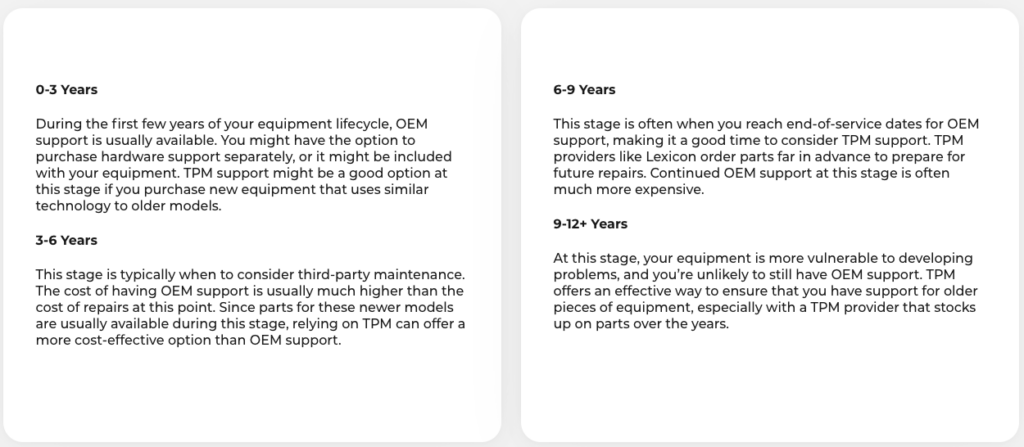Ready-to-Go Inventory with Discount Prices
From warehouses and distribution centers to schools and hospitals, hardware is essential to many businesses core functions. Malfunction can cause costly disruptions for organizations that rely on mobile computers, barcode scanners, printers or other hardware for their day-to-day operations.
Rather than waiting until a problem occurs, like hardware failure, organizations and businesses can lower risks with regular or preventative maintenance. Learn more about what hardware maintenance is and why it’s so important.
What Is Hardware Maintenance?

Hardware maintenance and support services are preventative and general repair services that physically repair or optimize hardware. These services can include contract maintenance, per-incident repair, part replacement, installation, and more.
A hardware maintenance contract can provide your business and organization with a reliable schedule for maintenance, updates, and repairs as needed. Maintenance helps lower the risk of ending up with prolonged downtime due to hardware failure, security problems, or other issues.
Why Do You Need Hardware Maintenance?
Hardware support is kind of like an insurance policy or OEM warranty. When you have insurance, you know you have support in the event that something costly or unfortunate happens. With a warranty, there’s less stress over the how and cost of repairs. A hardware maintenance contract can extend the life of your equipment, help prevent future costly repairs, and provides a network of expert technicians and resources. Hardware maintenance can be provided by the manufacturer or third-party maintenance provider.
Let’s break down several reasons maintenance is so important:
Identify Problems Before They Arise
A preventative maintenance program is one of the most effective ways to protect hardware from serious problems. This maintenance option reduces the risk of failure, extended downtime, and helps provide stable operations. Preventative maintenance is built around the concept of planned maintenance, but organized and scheduled differently to meet different business operation purposes.
Preventative maintenance involves inspecting hardware components to check for problems that could get worse. Having service personnel catch these problems early on means they can be handled right away. It might also involve performing other tasks necessary to keeping servers, hard drives, and other parts of your IT infrastructure up and running.
Security Threats
Hardware maintenance helps protect your data center from malware, viruses, data loss, and other types of cyber security threats. Without this type of maintenance, the data your business handles and stores could be compromised. For healthcare facilities, this means putting patients at risk of having sensitive medical information exposed. For businesses, this means putting customers or clients at risk of having financial information, personal information, or other sensitive information exposed. Ensure operating systems, networks, and other sources of data are up to date on virus protection and protection from other cyber security threats with regular maintenance.
Speed
There are few things more frustrating than a slow, unreliable device. Hardware that hasn’t been maintained can get clogged up over time, leading to delays and other issues. Maintenance for hardware components helps ensure that this equipment can run at optimal speed. This lowers the risk of delays or potentially costly errors when data is entered into systems. Service personnel can inspect and maintain your servers, hard drives, and other equipment to keep it functioning at the right speed.
Work Efficiency
One major benefit of hardware support is that it optimizes overall performance of your fleet. Employees working with hardware that experiences frequent issues can lead to lower productivity in your business, long downtime periods, productivity loss, and frustrated employees.
System Maintenance
This type of maintenance might involve checking for system errors and fixing any that are found, defragmenting hard drives, or managing space on your hard drives. Having your IT department handle these tasks can become time-consuming and take away from their other responsibilities. If you don’t have an IT department, ensuring that this type of maintenance is done regularly can be even more difficult.
A preventative maintenance contract can be set up to include system maintenance. The provider you hire to handle this maintenance can make sure it’s done as often as needed. This helps free up time for your IT department and lowers the risk of encountering problems with your systems. The downtime needed for this type of maintenance is usually minimal, especially if it’s done on a regular basis.
Physical Maintenance
Hard drives, servers, and other hardware components can become covered in dust or other debris. This can interfere with the way they function, resulting in the need for repair services. In severe cases, you might experience hardware failure if layers of dust or other debris accumulate on or in this equipment. Other hazards that can affect your equipment include extreme temperatures and exposure to liquids or moisture.
Physical maintenance involves making sure hardware components are safe from these hazards. Service personnel can clean and inspect hardware equipment to ensure that they are free of dust or debris and functioning properly. This type of maintenance might also involve making sure that hardware is not being stored or used in areas that might expose it to extreme temperatures or moisture, such as moving hard drives away from windows.
OEM Hardware Maintenance vs. Third-Party Hardware Maintenance

Original equipment manufacturer (OEM) hardware maintenance comes from the manufacturer of your equipment. This support is usually offered during the first few years and most do not offer EOL support. A third-party maintenance provider can provide you with technical support for your devices and equipment at lower costs.
You might have a hardware warranty from the manufacturer, but this is only good for a certain amount of time. As you near the end of the warranty date, you should explore options for a third party maintenance provider to make sure that your hardware receives preventative maintenance. This type of support contract can also help ensure that you have access to prompt repair services or replacement parts as needed.
Third-Party Maintenance with Lexicon Tech
Lexicon Tech offers reliable third party maintenance and repairs for hardware components. We order bulk hardware replacement parts and store them in our warehouse, allowing us to provide timely repairs or replacements when needed. Our maintenance contract can help ensure that your business or organization is able to run smoothly with minimal disruptions.
Contact Lexicon to learn more about our service contracts for hardware equipment.